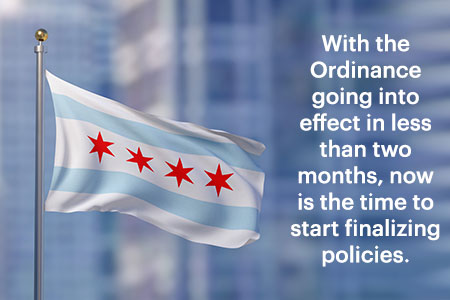Chicago Releases Paid Leave and Paid Sick Leave Final Rule
By Stephanie Dorning, JD, Employment Law Counsel
Published May 14, 2024

Nearly six months after passing its new Paid Leave and Paid Sick and Safe Leave Ordinance, the City of Chicago has released guidance on the topic in the form of their Final Rule. While the rule, available on the BACP website, does not significantly deviate from the earlier proposed rules, there is some important information employers should know.
Sick Leave Carryover. The final rule confirms that employers must allow employees to carryover unused paid sick leave, regardless of whether leave is granted through frontloading or accrual. Employees may rollover up to 80 hours of leave, which will be in addition to the paid sick leave earned or granted in the following year. This provision is limited to paid sick leave and does not apply to employers who frontload the paid leave.
Denial of Leave. The rule specifies that employers may require “reasonable preapproval” for employees using paid leave to ensure continuity of business operations. Employees must have reasonable access to the leave, and overly restrictive policies would be in violation of the ordinance. Blackout dates and restrictive periods are allowed, but only so long as employees can reasonably use their paid leave outside of these restrictions.
Other factors employers should consider when determining whether to approve or deny leave include:
- Whether granting the paid leave would significantly impact business operations.
- Whether the employer provides a need or service critical to the health, safety, or welfare of the people of the City of Chicago.
- Whether similarly situated employees are treated the same for the purpose of reviewing, approving, and denying paid leave.
- Whether granting paid leave during a particular time period would significantly impact business operations.
Notice and Posting Requirements. The final rule introduces some changes to the notification requirements employers must follow including:
- Workplace Poster. This notice must be posted through the employer’s usual method of communication. If 5% or more of the workforce is not literate in English, the notice must be made available in the language understood by those employees.
- Available Leave. Employers must provide notice to employees of how much paid sick leave and paid leave is available for use. This can be done through any reasonable method, including paystubs, an online database, handwritten records, etc.
- New Hire Notification. Notice of the employer’s policy must be provided prior to employee commencing work or as part of the onboarding process.
- Annual Notification. Employers must provide notification of their policy and the employee’s available leave within 30 days of July 1, 2024, and yearly thereafter. After the initial notice, the notice may be issued on a calendar, employment, or fiscal year.
- Policy Changes. Employers must provide at least 5 days written notice prior to making any changes to their policy or notification requirements. If the change will negatively impact an employee’s access to leave or how their leave is paid out, they must receive at least 14 days’ advance written notice.
With the Ordinance going into effect in less than two months, now is the time to start finalizing policies. Please join HR Source for our Navigating Paid Time Off in Chicago webinars held on May 22, 2024, and June 18, 2024. We will discuss the requirements of the ordinance and answer questions about what you can expect in the coming months.